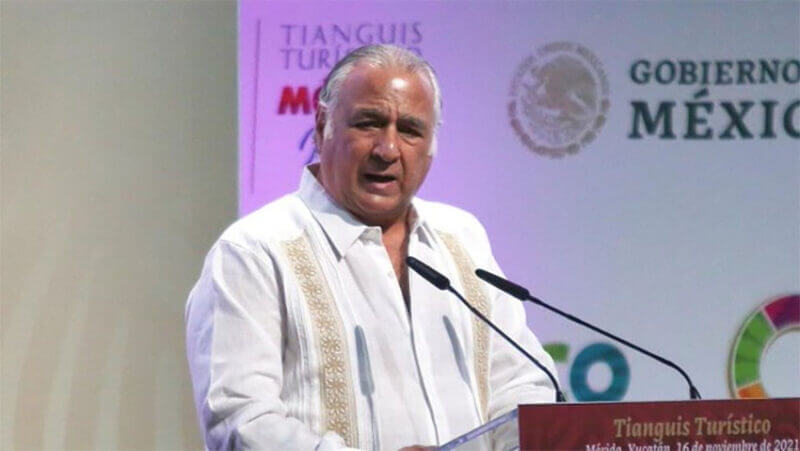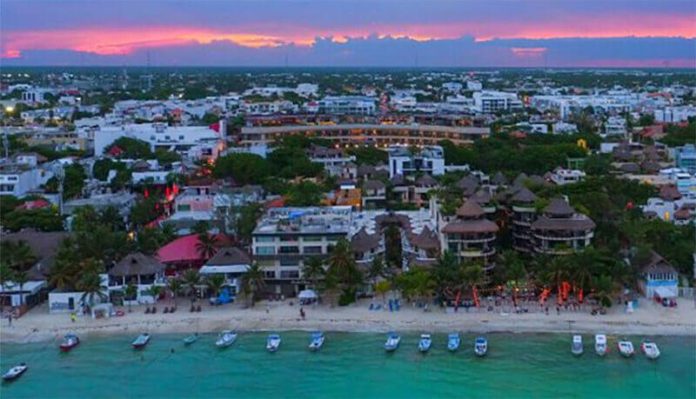A revolution in the way we travel is taking place in countries around the world including Mexico, Airbnb co-founder and chief strategy officer Nate Blecharczyk said Friday during an appearance at a tourism industry event in Mérida, Yucatán.
Speaking at the Tianguis Turístico – Latin America’s largest tourism industry event – Blecharczyk said the coronavirus pandemic has eliminated the need for people to work in specific places at specific times.
Tens of millions of people can now work from anywhere, travel whenever they want and stay away from home for longer, he said.
As a result, many people are living in Airbnb properties, Blecharczyk said, adding that the trend is occurring in Mexico.
“Traveling to Mexico has become a real trend for travelers from the United States. Tulum, Cancún, Mexico City and Playa del Carmen are some of the top trending destinations for U.S. travelers,” Blecharczyk said.
He presented data that showed that villas, cabins and country houses in Mexico were among the most searched listings on the Airbnb site.
The co-founder of the booking platform presented additional global data that showed that 20% of nights booked between July and September were for stays of one month or longer. More than 100,000 guests have stayed continuously on Airbnb for three months or longer during the past year and 45% of nights currently booked on the platform are for stays of one week or longer, up from 38% two years ago.
Six in 10 respondents to an Airbnb survey in Mexico said they were interested in working while traveling so that they can take advantage of their free time to explore and get to know new places, Blecharczyk said.
He also said there are Airbnb hosts in almost all of Mexico’s 132 Pueblos Mágicos, or Magical Towns. Listings in such towns have increased 170% since 2018, Blecharczyk said, adding that as of the end of last year 11,000 families in Pueblos Mágicos had obtained extra income by listing properties on the site.
Earlier this week, President López Obrador inaugurated the 45th edition of the Tianguis Turístico, which was originally slated to be held in Mérida in March 2020 but was postponed due to the pandemic. The event began Tuesday and concludes Friday.
“What in essence this act means is to inaugurate a new stage in the public life of our country, to come out of the tunnel of darkness we were in because of the pandemic,” López Obrador said.

He lauded the Yucatán Peninsula as a tourism destination, saying it is an “extraordinary region” filled with “archaeological riches.”
“That’s why [we’re building] the Maya Train [railroad], to connect the new and old Mayan cities. In what region of the world are there as many archaeological sites as the Mayan region?” the president said.
The railroad will spur tourists to go beyond the beach and explore, López Obrador said.
For his part, Tourism Minister Miguel Torruco said international tourism declined 46% in Mexico last year compared to a 73% worldwide contraction.
He said López Obrador’s instruction not to restrict the entry of international flights during the pandemic and the implementation of bio-health protocols designed by the Tourism Ministry in close coordination with the Health Ministry allowed Mexico to welcome more international tourists than most other countries. In addition, Mexico has never required incoming travelers to quarantine, present a negative COVID test result or show proof they are vaccinated.
Torruco predicted that international tourist numbers will total 31 million in 2021 and the economic spillover will be US $18.1 billion. It’s estimated that tourism’s contribution to GDP will be 7.1% this year and 8.3% in 2022, he said. The latter figure is almost on a par with 2019 levels.
The tourism minister noted that 490 tourism projects worth a combined US $9.1 billion are currently being built, generating more than 156,000 direct and indirect jobs.
“In addition, in the first half of 2021, Mexico attracted US $711 million in direct foreign tourism investment, and in the second quarter the number of people working in the [tourism] sector was about 4 million – 249,000 more jobs than in the first quarter of the year,” he said.
“… All these statistics are without a doubt encouraging. They show that tourism activity is in the process of recovery,” Torruco said.
With regard to the Tianguis Turístico, the tourism minister said that all 32 Mexican states were represented and that more than 1,500 tourism-sector buyers from 970 companies in 42 countries would be in attendance. Some 95% of all international tourists who come to Mexico are nationals of those 42 countries, Torruco said.
Mexico News Daily
